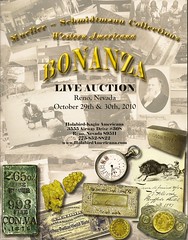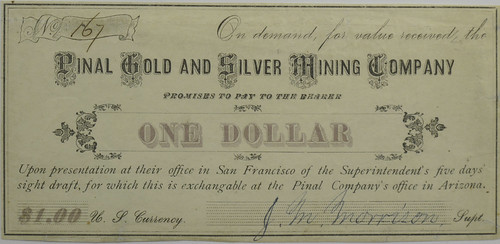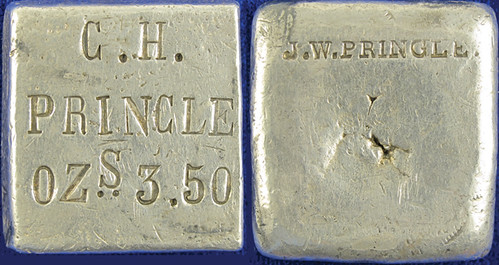
PREV ARTICLE
NEXT ARTICLE
FULL ISSUE
PREV FULL ISSUE
HOLABIRD-KAGIN WESTERN AMERICANA AUCTION OCTOBER 29-30, 2010
This week my copy of the Holabird-Kagin Western Americana Bonanza auction catalog arrived this week. Fred Holabird kindly sent me the text and images of a few lots I found interesting. Thanks! Here are some excerpts.
-Editor
Lot #243~Tucson~Pima County~Pinal Gold and Silver Note
~C1880~Note No. 167. This Pinal Gold and Silver Mining Company one-dollar note is probably the only such note extant. Extremely Rare, One Dollar U.S. Currency #167 printed on bond paper. “One Dollar” printed in center, signed by J. M. Morrison, Superintendent.

The Pinal Gold and Silver Mining Company was formed in late 1876 and operated until about 1879. It was reformed in the mid 1880's as the Pinal Consolidated MC with significant production. The Pinal Gold & Silver MC office was located in San Francisco, at 402 Montgomery, from 1876 until 1878. The superintendent listed on the bank note, J. M. Morrison, is not listed as a resident of San Francisco during that period and may have been the mine Superintendent in Arizona, Lot #896~Rosita~J.W. Pringle Silver Ingot 3.50 oz. ~c1873

James William Pringle was born in Scotland in 1838. Many members of the Pringle family immigrated to America for various mining rushes. James, along with other family members, first settled in New York. In 1857 he was off to California to seek a fortune in gold. According to his biography, he was "fairly successful" in California, remaining there until 1864. Learning "placer mining" in California, Pringle took his trade to the gulches of eastern Oregon, Idaho and Montana. By 1870, Colorado got his attention, and he was one of the early prospectors to venture into the San Juan Mountains, which later became an area of intense prospecting and metal production. Pringle found silver in Rosita, and there he made his home, and a name for himself. Silver was discovered here in 1870.
For more information on the sale, see:
www.holabirdamericana.com
The Numismatic Bibliomania Society is a non-profit organization promoting numismatic literature. See our web site at coinbooks.org. To submit items for publication in The E-Sylum, write to the Editor at this address: whomren@gmail.com To subscribe go to: https://my.binhost.com/lists/listinfo/esylum All Rights Reserved. NBS Home Page Contact the NBS webmaster 
|
